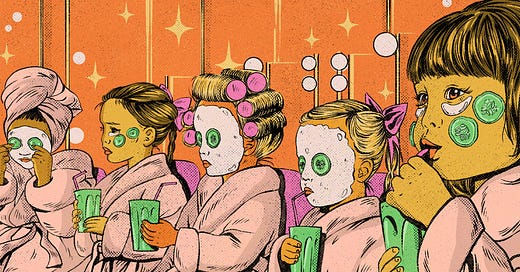Serum Moms Are The New Almond Moms
Read my latest Ask Ugly column, all about baby skincare.
The next installment of Ask Ugly, my monthly beauty advice column for the Guardian, is here!
A preview:
Hey Ugly,
My question is about beauty culture showing up for literal infants. My daughter is seven months old and pretty much since birth I’ve been getting ads for products to get rid of her cradle cap (a totally normal and 100% harmless thing that has the appearance of large dandruff-type flakes on her scalp) and treat her baby acne (also an extremely normal and harmless thing among newborns).
I’m curious to know if you’ve come across this, the market reach of these purely cosmetic products for babies, and your thoughts on transferring our beauty-obsessed culture to our babies.
Signed,
Annoyed New Mom
When I think “baby,” I think “beauty ideal”.
Lotions sold to adults have long promised baby-softness. Collagen creams claim to deliver plump, bouncing baby cheeks. The skincare industry boasts a best-seller called Babyfacial (an exfoliating treatment), a brand called Bejbi Skin (pronounced “baby skin”), and a column called “Operation Goo Goo Gah Gah” (an ode to anti-aging, once penned by Ziwe for Into The Gloss).
Interested parties can also choose between multiple face masks inspired by vernix, the waxy, white substance newborns come out coated in: perhaps Mutha’s Rebirth Vernix Mask, $110 or Biologique Recherche’s Creme Masque Vernix, $209. And to think your womb manufactures the real thing for free!
But what the industry builds up, it eventually tears down. Lately, it’s encouraging customers to surgically suck the “baby fat” from their faces via buccal fat removal and – as you’ve noticed, Annoyed New Mom – slather their once-idealized infants in serum.
Does this make sense? No! And it doesn’t have to, as long as it makes money. Category entrants like toddler-sized “rejuvenating” sheet masks and a $115 Baby Dior “hydrating milk” moisturizer helped the baby and child skincare sector earn a $250m valuation this year. That number is expected to grow to $380m by 2028.
This is concerning, mostly because babies do not need skincare. In fact, quite the opposite is true.
The rest of my answer includes:
research on the physical damage done by baby skincare — eczema, hay fever, asthma, etc.
my theory of the “Serum Mom”, the Almond Mom’s face-focused counterpart (like the Almond Mom, the Serum Mom is obsessed with meeting a certain standard of beauty, and nurtures the same obsession in her children. Skincare reigns supreme; ageless, poreless, spotless skin — inhuman skin, in other words — is highly valued; and if your face is less than perfect, a couple new products should do it)
a rebuttal to the dismissive “it’s just lotion! what’s the big deal!” argument
a study that suggests focusing on skincare creates skin insecurity (as teen skincare use rises, teens now cite “skin” as their number one body insecurity, and “weight” as number two)
the best way to support your infant’s skin if/when they experience cradle cap or baby acne
and more!
Click through to the Guardian to read the whole thing (and if you decide to share it with friends or on social media or whatever, please share it via the Guardian link).
Have a question for Ask Ugly? Submit it anonymously here — and be as detailed as possible, please!
P.S. Here’s a tidbit that was cut from the final Guardian edit: Serum Moms are not only powering the baby skincare market by consuming these products, but by conceiving of them in the first place. Dr Barbara Sturm credits her eight-year-old daughter Pepper with inspiring the brand’s $210 Baby & Kids Essentials Set. Beauty executive Samantha Cutler said it wasn’t until she became a mother that she considered entering the “new essential category” of children’s beauty products with her company Petite ‘N Pretty. I expect to see the launch of more baby and adolescent product lines as established entrepreneurs become mothers (Tara Tersigni of Jones Road Beauty, Emily Weiss of Glossier) and vice versa.





There’s also the factor of the instagrammification of motherhood, where every part is supposed to look polished and adorable. This contrasts hard with the fact that infants are frequently, normally, completely gross. They are splotchy, scabby, snotty, exploding with poop. And if you you’ve lived your life watching airbrushed motherhood online, you will be very anxious about the appearance and apparent “health” of an actual baby.
(Yes, I’m a parent. I like my kid. Babies are gross, tho.)
Ahhh, Jessica. This column today is the reason I subscribe. I'm a sociologist and I teach about beauty and the body...and silly me thinks I know one or two things about the social construction of beauty. And then -splat-. You reveal to me the contours of your cogent insights AND yet another aspect of the atrociousness of capitalism, misogyny, and super-commodified self-hatred. In other words, thank you. And, I'm gobsmacked.